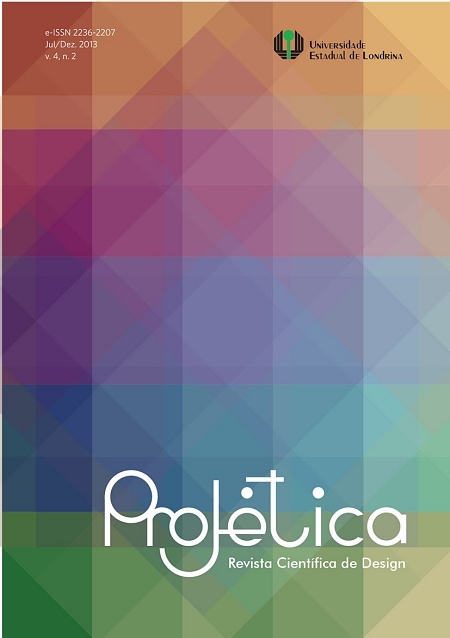Product-Service System: Ananalysisoftheapplicationof design management in a case ofservitization in clothingproducts
DOI:
https://doi.org/10.5433/2236-2207.2013v4n2p97Keywords:
Fashion design, Children’s Clothing, Clothing with learning conceptsAbstract
Garments with innovative features, such as those that generates knowledge by elements inserted into the pieces, is a trend in the market directed to the children’s segment. Thus, this study seeks to guide the design of children’s clothing that aim to learning, combining design concepts. For this, a survey was conducted of the theoretical issues that surround this topic and as a result is presented a set of recommendations for the production of this type of clothing.Downloads
References
AZARENKO, A. et al. Technical product-service systems: some implications for themachine tool industry. Journal of Manufacturing Technology Management, London, v. 20, n. 5, p. 700-722, 2009.
BHAMRA, T.; LILLEY, D.; TANG, T. Design for Sustainable Behaviour: using products to change consumer behavior. The design Journal, London, v. 14, n. 4, p.427-445, 2011.
BORCHARDT, M.; SELLITTO, M. A.M.; PEREIRA, G.M. Sistemas produto-serviço: referencial teórico e direções para futuras pesquisas. Revista Produção Online, Florianópolis, v.10, n. 4, p.837–860, 2010.
FLETCHER, K. Moda & sustentabilidade: design para mudança. São Paulo: SENAC-SP, 2011.
HANSEN, C.T.; ANDREASEN, M.M. Two approaches tosyn thesis based on domain theory. London: Springer-Verlag, 2002.
KAZAZIAN, t. Haverá a idade das coisas leves: design e desenvolvimento sustentável. São Paulo: Ed. SENAC, 2005.
LAITALA, K.; BOKS, C. Sustainable clothing design: use matters. Journal of Design Research, Genèva, v.10, n. 1-2, p.121-139, 2012. Disponível em: http://inderscience.metapress.com/ content/w81206135wv62684/. Acesso em: 12 mar. 2013.
MANZINI, E; VEZZOLI, C. Product-Service Systems and Sustainability. Paris: UNEP, Division of Technology Industry and Economics. 2003.
MANZINI, E; VEZZOLI, C. O Desenvolvimento de Produtos Sustentáveis: os requisitos ambientais dos produtos industriais. São Paulo: Edusp, 2002.
MCALOONE, T.; ANDREASEN, M. Design for utility, sustainability and societal virtues: Developing Product Service Systems. In: INTERNATIONAL DESIGN CONFERENCE : DESIGN, 2004, Dubrovnik. Proceedings… Dubrovnik, 2004.
MONT, O. K. Clarifying the concept to product–service system. Journal of Cleaner Production, Amsterdam, v. 10, p. 237–245, 2002.
PAPANECK, V. Arquitetura e Design. Lisboa: Edições 70, 1995.
RESE, M.; STROTMANN, W.; KARGER, M. Which industrial product service system fitsbest? Evaluating flexible alternatives based on customers’ preference drivers. Journal of Manufacturing Technology Management, London, v. 20, n. 5, p. 640-653, 2009.
SPRING, M.; ARAÚJO, L. Service, services and products: rethinking operations strategy. Internacional Journal of Operations & Production Management, Bradford, v. 29, n. 5, p. 444-467, 2009.
TREPTOW, D. Inventando Moda: planejamento de coleção. 5. ed. São Paulo, 2013.
TUKKER, A. Eight typesof product–service system: eight ways to sustainability? Experiences from SusProNet. Business Strategy and the Environment, v. 13, n. 4, p. 246–260, 2004.
YANG, X.; MOORE, P.; PU, J.; WONG, C. A practical methodology for realizing product service systems for consumer products. Computers& Industrial Engineering, New York, v. 56, p. 224–235, 2009.
Downloads
Published
How to Cite
Issue
Section
License
Copyright (c) 2013 Projetica

This work is licensed under a Creative Commons Attribution 4.0 International License.
Projética está licenciada sob a Creative Commons Attribution CC-BY 4.0 International. Os autores detém os direitos autorais e concedem à revista o direito de exclusividade de primeira publicação.
Os autores dos trabalhos aprovados autorizam Projética a, após a publicação, ceder seu conteúdo para reprodução em indexadores de conteúdo, bibliotecas virtuais e similares.
Os autores assumem que os textos submetidos à publicação são de sua criação original, responsabilizando-se inteiramente por seu conteúdo em caso de eventual impugnação por parte de terceiros. As opiniões emitidas pelos autores dos artigos são de sua exclusiva responsabilidade.
A revista se reserva o direito de efetuar, nos originais, alterações de ordem normativa, ortográfica e gramatical, com vistas a manter o padrão culto da língua e a credibilidade do veículo. Respeitará, no entanto, o estilo de escrever dos autores. Alterações, correções ou sugestões de ordem conceitual serão encaminhadas aos autores, quando necessário. Nesses casos, os artigos, depois de adequados, deverão ser submetidos a nova apreciação. As provas finais não serão encaminhadas aos autores.











